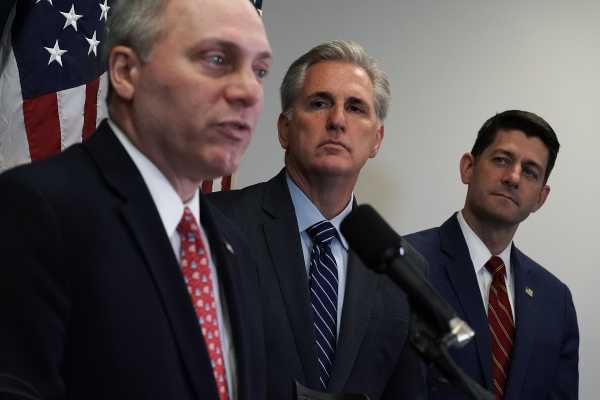
At 1:42 pm on Thursday, the Associated Press reported what would have been a major breakthrough in House Republicans’ thus-far stalled immigration fight: Rep. Jeff Denham (R-CA) said he had struck a tentative deal with conservatives.
By 1:47 pm, the deal was off.
“No deal,” Rep. Mark Meadows (R-NC), the chair of the conservative House Freedom Caucus, said with a chuckle, saying there was no agreement to begin with. “There is no tentative deal. There is no deal.”
That five minutes is the best articulation of the House’s immigration debate, in which moderate Republicans are pressuring Speaker Paul Ryan to call a vote on legislation to fix the Deferred Action for Childhood Arrivals (DACA) program. There’s a lot of talk but no actual movement, and no one knows how this will end.
House Republicans are desperately trying to resolve what has been two decades of irreconcilable differences on immigration policy in less than a week. The backdrop to this fight is a discharge petition, pushed by a group of frustrated moderates and Democrats who want to see action on DACA, that’s only three signatures short of triggering votes on four immigration bills: two more moderate proposals, a conservative bill, and one up to Ryan to decide.
But Ryan desperately wants to avoid the messy immigration fight that would come with bringing Democrats into the immigration debate. On Thursday, he called House Republicans together for a two-hour “family meeting” on immigration policy to show moderates he’s willing to talk meaningfully about DACA and get a majority of the GOP on the same page. Moderates said they’d hold off on the petition, for now, but it was clear the meeting didn’t establish any consensus.
“I feel like a family with a small ‘f.’ That’s as nice as I could put it,” Rep. Mark Amodei (R-NV), who has signed the discharge petition, said. Republicans had left the party’s many unresolved issues, like whether to give young immigrants brought to the US illegally a path to citizenship, on the table.
But moderates say doing nothing is no longer an option. If there’s no compromise in the next week, they say, they’ll deliver the discharge petition and force Ryan to take the immigration fight to the floor.
The discharge petition is very close. Negotiations on a compromise are not.

Twenty-two Republicans and all Democrats but one — Texas Rep. Henry Cuellar — have signed the discharge petition. At 215 signatories, it requires three more to force votes on the floor. Cuellar said he has told Democratic leadership he would sign on if they promised to fight harder against the southern border wall.
The signatures would trigger votes on the House floor on four bills using an obscure rule called the “queen of the hill.” Under this rule, whichever bill passes by the biggest margin wins. As Vox’s Dara Lind explained, two of the bills that would get votes would give permanent legal status to DACA recipients; the third is a conservative proposal from Rep. Bob Goodlatte (R-VA), which gives temporary status to DACA recipients, makes deep cuts to legal immigration, and boosts interior enforcement. The fourth bill is at Speaker Ryan’s discretion. Because Republicans have such a slim majority, it’s likely the more moderate proposals would pass.
But Ryan has made it very clear he’s not happy with this discharge petition. He’s said it will cede control of the floor to Minority Leader Nancy Pelosi by allowing bills to get through with mostly Democratic support. And he says President Donald Trump wouldn’t sign on. Needless to say, a series of contentious votes on a divisive issue like immigration also wouldn’t be a good look for Republicans in a high-stakes election year.
Meanwhile, House conservatives don’t want the petition to get through either, knowing their preferred bill probably wouldn’t get the most votes in a “queen of the hill” scenario.
So to take control of the situation, Ryan is trying to negotiate a compromise between moderates and conservatives that follows the demands put forward by the White House. The White House has outlined four pillars: legal status for DREAMers, an end to the diversity visa lottery, funding for the border wall, and a significant reduction to family-based migration — which would substantially cut legal immigration.
There’s one big problem: No one can agree to those demands.
“This is an issue that everything is complicated, everything is controversial,” said Rep. Mario Diaz-Balart (R-FL), who has signed the discharge petition. When asked how much disagreement there is on Trump’s four pillars, he said, “There is disagreement on everything.”
Conservatives have reportedly made several overtures to moderates, including proposals that would give DREAMers short-term guest-worker visas. But moderates say they are waiting to see legislative text before fully signing on. Meadows would neither confirm nor deny such offers.
And moderates are getting impatient. They want to find a compromise soon and are using the discharge petition as “leverage.” If they can’t reach a deal with their fellow Republicans, they’ll band with Democrats to get the signatures they need to force votes.
The divisions in the Republican Party remain the same

Immigration has always been tough for Republicans, and Trump has only escalated the divisions. The White House’s “four pillars” immigration bill covers both legal and illegal immigration.
The central question at the moment is around citizenship for DREAMers. Officially, the White House proposal establishes a pathway to citizenship for 1.8 million DACA-eligible immigrants. But that goes too far for most of the House’s most conservative members. There’s debate about whether something lesser — legal status through a special visa or something different altogether — would suffice. Meanwhile, some hardline conservatives are uncomfortable with any legalization for these immigrants.
The lack of compromise isn’t surprising. DACA has been stuck in legal limbo in the courts ever since the Trump administration said last year it would sunset the program, and Congress hasn’t been about to reach any meaningful alternative.
As Rep. Patrick McHenry (R-NC), who helps whip votes for Ryan, said, “There is no fairy dust in Congress; therefore, we have no immigration bill.”
And Trump’s White House has complicated the conversation by adding demands to cut legal immigration. Because they’ve been stuck on a DACA fix, the House hasn’t even begun to publicly engage in the debate over legal immigration.
Denham told Vox two weeks ago that he could only see a path forward on a narrow DACA and border security bill. Ryan also reportedly told the conference that any compromise was unlikely to include provisions on guest-worker visas and e-verify measures, which the conservative proposal from Goodlatte includes.
At this point, Rep. Dana Rohrabacher (R-CA), another vulnerable Republican, told Vox there isn’t even consensus on what the four pillars are.
“Right now people are just putting ideas on the table and leadership is taking them down,” Rohrabacher said.
The White House framework has already failed in the Senate. The House is ignoring that.
Republican leaders keep saying they want to pass something in the House that can become law. But it’s not clear that they’re taking any steps to make that a reality.
Any bill that is going to make it to Trump’s desk has to pass the Senate, where it will need support from Democrats to meet the 60-vote threshold. But looming over this House debate is Congress’s first immigration fight this year — the Senate’s. In February, the Senate struck down three immigration proposals that addressed DACA. The White House-inspired bill, which Ryan is now trying to push in the House, got the fewest votes in the Senate.
At this point, Ryan doesn’t seem to care.
“If I sat around as speaker of the House and thought about what can the United States Senate do, we wouldn’t do anything,” Ryan said. “So we don’t spend our time thinking about votes in the Senate. We spend our time thinking about how we can get consensus here in the House Republican conference and getting bills through the House.”
Sourse: vox.com






